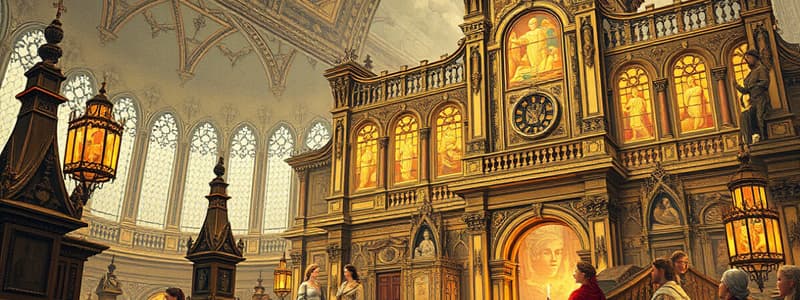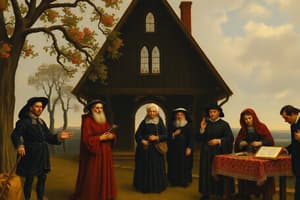Podcast
Questions and Answers
What was one primary reason the nobility supported the king's absolute power?
What was one primary reason the nobility supported the king's absolute power?
- To maintain their wealth and position (correct)
- To challenge the authority of the Catholic Church
- To promote civil rights for Protestants
- To ensure the independence of Alsace
What role did the church play in the education system of France during this time?
What role did the church play in the education system of France during this time?
- It only managed the education of the wealthy elite.
- It was a minor player with little influence on education.
- It was primarily focused on secular education initiatives.
- It was responsible for most of the education system and provided aid and charity. (correct)
How did the Catholic Church impact the daily lives of ordinary people in France?
How did the Catholic Church impact the daily lives of ordinary people in France?
- It promoted independence from governmental oversight
- It played a significant role in their education and welfare (correct)
- It was primarily a financial institution benefiting the elite
- It provided civil rights for all religious groups
What are parlements in the context of France's judicial system?
What are parlements in the context of France's judicial system?
What motivated officials to purchase 'offices' during this period in France?
What motivated officials to purchase 'offices' during this period in France?
How did the church provide hope to peasants in the countryside?
How did the church provide hope to peasants in the countryside?
Which group in France, numbering around 550,000, faced significant restrictions under the king's rule?
Which group in France, numbering around 550,000, faced significant restrictions under the king's rule?
What was a consequence for officials who benefited from the king's absolute power?
What was a consequence for officials who benefited from the king's absolute power?
How did the church influence the dissemination of information during this period?
How did the church influence the dissemination of information during this period?
What was a significant source of revenue for the church in France?
What was a significant source of revenue for the church in France?
Who typically appointed higher-ranking clergy in France during Louis XVI's reign?
Who typically appointed higher-ranking clergy in France during Louis XVI's reign?
What did many French citizens feel towards their parish priests?
What did many French citizens feel towards their parish priests?
What role did the idea of the 'divine right of kings' play in French society in the eighteenth century?
What role did the idea of the 'divine right of kings' play in French society in the eighteenth century?
How did higher-ranking clergy often increase their wealth?
How did higher-ranking clergy often increase their wealth?
What characterized the education of the common population in France during Louis XVI's reign?
What characterized the education of the common population in France during Louis XVI's reign?
What term describes the government of pre-revolutionary France, as characterized by the dependence on wealthy elites?
What term describes the government of pre-revolutionary France, as characterized by the dependence on wealthy elites?
What status did the clergy hold in the hierarchy of French society during the reign of Louis XVI?
What status did the clergy hold in the hierarchy of French society during the reign of Louis XVI?
What was the legal status of all subjects in France regarding religion?
What was the legal status of all subjects in France regarding religion?
What was a common belief among Enlightenment writers regarding societal improvement?
What was a common belief among Enlightenment writers regarding societal improvement?
Which aspect of the British Bill of Rights did Voltaire particularly admire?
Which aspect of the British Bill of Rights did Voltaire particularly admire?
Even though Voltaire's book was banned in France,...
Even though Voltaire's book was banned in France,...
How did Enlightenment philosophers view the authority of the king?
How did Enlightenment philosophers view the authority of the king?
What common theme was shared by Enlightenment thinkers despite their differences?
What common theme was shared by Enlightenment thinkers despite their differences?
What critical social issue did Enlightenment writers challenge in French society?
What critical social issue did Enlightenment writers challenge in French society?
What was a primary reason the nobility continued to support the king's policies despite his claim to absolute power?
What was a primary reason the nobility continued to support the king's policies despite his claim to absolute power?
What was the role of purchased 'offices' for officials in France during this period?
What was the role of purchased 'offices' for officials in France during this period?
Which group faced significant social and civil restrictions under the king's rule in France?
Which group faced significant social and civil restrictions under the king's rule in France?
How did the church contribute to the wealth of its officials?
How did the church contribute to the wealth of its officials?
What underlying issue did the majority of the population struggle with during the king's reign?
What underlying issue did the majority of the population struggle with during the king's reign?
Which statement best characterizes the Catholic Church's relationship with the nobility?
Which statement best characterizes the Catholic Church's relationship with the nobility?
What was one major influence on Enlightenment philosophers during the Age of Enlightenment?
What was one major influence on Enlightenment philosophers during the Age of Enlightenment?
What did Voltaire, also known as François-Marie Arouet, primarily advocate for?
What did Voltaire, also known as François-Marie Arouet, primarily advocate for?
In what context did many Enlightenment philosophers publish their critical works?
In what context did many Enlightenment philosophers publish their critical works?
What was a shared goal of Enlightenment philosophers?
What was a shared goal of Enlightenment philosophers?
How did the scientific revolution contribute to the Enlightenment?
How did the scientific revolution contribute to the Enlightenment?
What was a common fate for many philosophers during the Enlightenment period?
What was a common fate for many philosophers during the Enlightenment period?
What perspective did philosophers like Denis Diderot promote regarding laws?
What perspective did philosophers like Denis Diderot promote regarding laws?
What was a notable aspect of Voltaire's life experience?
What was a notable aspect of Voltaire's life experience?
What role did criticism and reform play for Enlightenment thinkers?
What role did criticism and reform play for Enlightenment thinkers?
What was one effect of changes in scientific understanding during the Enlightenment?
What was one effect of changes in scientific understanding during the Enlightenment?
Study Notes
Religious and Social Structure in France
- Approximately 550,000 Protestants lacked civil rights and faced intolerance, existing primarily in Alsace.
- About 30,000 Jews in France experienced similar curtailment of rights.
- The Catholic Church significantly influenced everyday life, providing education, aid, and essential services to the poor, including running most hospitals and orphanages.
Role of the King
- The king claimed absolute power but relied on the nobility and officials to implement policies, benefiting their wealth and security.
- Many officials purchased offices, paying taxes to ensure financial stability, thereby sustaining the existing government system.
Church's Influence
- The Church provided hope in challenging times, blessing agricultural ventures and performing critical life events (births, deaths, marriages).
- It owned roughly 10% of land and earned revenue from tithes, dividing public sentiments between local parish priests and higher-ranking clergy, who were often nobles appointed by the king.
Legal System and Governance
- France was divided into thirteen parlements, acting as high courts that registered laws but could not override the king.
- Laws varied regionally, with northern provinces relying on customary law and southern provinces on Roman-derived laws, leading to jurisdictional disputes.
Socioeconomic Conditions
- Despite vast poverty, the king remained a popular figure, evoking strong public emotions during events like his coronation.
- The "divine right of kings" concept persisted in the 18th century, legitimizing royal power.
Education and Enlightenment
- By the time of Louis XVI, literacy was approximately one-third in France, with equal participation among poorer classes in the evolving educational landscape.
- The growth of newspapers, libraries, and public forums (e.g., coffee houses and salons) fostered political discussions and intellectual exchange.
Enlightenment Ideas
- The Age of Enlightenment emerged, emphasizing rational thought and criticism of traditional authority, including the Church and state.
- Notable figures like Denis Diderot advocated for knowledge dissemination through the "Encyclopedia," shaping societal views on governance.
Political Evolution
- The Estates General, created in 1302, consisted of three estates: clergy (First Estate), nobility (Second Estate), and commoners (Third Estate), intended to offer counsel during crises.
- King Louis XIV's decision to revoke Protestant rights in 1685 marked a pivotal point leading toward Enlightenment values and the eventual push for social reforms.
Governance of Pre-Revolutionary France
- France had a complex administration system characterized by various jurisdictions and inconsistent rules benefiting the privileged classes.
- Louis XVI claimed absolute authority, but regions distant from Paris often operated with a degree of autonomy, influencing their taxation rates in dialogue with the king's ministers.
- The government structure has been termed a plutocracy, favoring a small minority of wealthy individuals, primarily the nobility and clergy.
Role of the Roman Catholic Church
- The Roman Catholic Church was central to French society, simultaneously wealthy and politically powerful.
- By law, all subjects were recognized as Catholics, with no public practice allowed for other religions; Protestants faced legal prohibitions and civil rights restrictions.
- Approximately 550,000 Protestants existed in France, mainly tolerated only in Alsace; Jewish rights were similarly limited.
The King's Dependence on Nobility
- To maintain control over France, the king relied heavily on the nobility, who benefited personally from sustaining the existing government.
- Officials purchased "offices" which allowed them to secure wealth and status, promoting a stable system that ensured their financial security amidst widespread poverty.
Influence of the Enlightenment
- The Age of Enlightenment emerged, influenced by the scientific revolution, emphasizing observation and rationality to address societal issues.
- Philosophers aimed to improve society through criticism and reform, although their works faced censorship in France.
Contributions of Key Enlightenment Figures
- Denis Diderot, living from 1713 to 1784, compiled the "Encyclopedia," promoting knowledge and rational thought while challenging traditional authority, particularly the church and state.
- Voltaire (François-Marie Arouet), active from 1694 to 1778, critiqued absolute monarchy and advocated for rights such as freedom of speech and religion; he praised Britain's constitutional principles.
Core Ideas of Enlightenment Philosophy
- Enlightenment writers shared a common belief that society could improve through rationality rather than tradition or superstition.
- They challenged the authority of the monarchy and the Catholic Church, advocating for rights based on reason and the will of the people.
Diderot and Rousseau on Sovereignty
- Diderot emphasized the importance of critical thinking and rational understanding in society, striving for a knowledgeable and equitable world.
- Jean-Jacques Rousseau articulated the concept of legitimate governance deriving from the general will of the people, stating that a ruler's power must be legislative and cannot act without the people's assembly.
Studying That Suits You
Use AI to generate personalized quizzes and flashcards to suit your learning preferences.
Description
Explore the complex relationship between the monarchy and various religious groups in France, focusing on the rights of Protestants and Jews during a time of absolute monarchy. This quiz delves into how the king ruled France and the role of the nobility in governance.




